|
|
|
Sort Order |
|
|
|
Items / Page
|
|
|
|
|
|
|
| Srl | Item |
| 1 |
ID:
107065
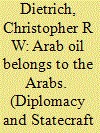

|
|
|
|
|
| Publication |
2011.
|
| Summary/Abstract |
Drawing from material in American and British national archives, the Johnson and Nixon presidential libraries, the archives of the International Monetary Fund, and the United Nations record, this article examines the international politics surrounding the June 1972 nationalisation of the Iraq Petroleum Company. The response to the nationalisation reveals a complex relationship between traditional Cold War concerns and the emergence of a Third World challenge to the structure of the post-war international economy: the practice of raw material sovereignty. Although Soviet aid to the Ba'ath government was central to nationalisation, it was far from exclusive. Accordingly, the nationalisation illustrates the dynamism of the Cold War era and places on display important forces that operated independently of Cold War constraints.
|
|
|
|
|
|
|
|
|
|
|
|
|
|
|
|
| 2 |
ID:
139825
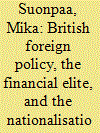

|
|
|
|
|
| Summary/Abstract |
The analysis examines the role of British financial institutions, namely the Bank of England and the Corporation of Foreign Bondholders [CFB], in the making of British policy towards Turkey. The nationalisation of the Constantinople Quays Company, a port operator purchased in 1907 by the British and French governments, serves as a case study through which business–state relations, the role of finance in the conduct of international relations, and the impact of perceptions on policy decisions are explored. In this case, the financial elite’s role was minimal during most of the period considered, becoming more important in the final war years in a framework of the Anglo–Turkish debt restructuring negotiations of 1944. Significantly, the CFB, rather than the Bank, represented the British government in the negotiations. There exists an abundance of evidence of the divergent views between Whitehall and the financial elite about Turkey’s trustworthiness as a debtor and a signatory to treaties. The British government’s perceptions were much more positive than those of the financial elite. This difference stemmed from the different interests involved: Whitehall sought to secure Turkey’s collaboration in the increasingly unstable global security environment while the Bank and the CFB were more concerned with investor and bondholder interests and attempted to avoid further financial losses.
|
|
|
|
|
|
|
|
|
|
|
|
|
|
|
|
| 3 |
ID:
091410


|
|
|
|
|
| Publication |
2009.
|
| Summary/Abstract |
The European Council's 2008 'Immigration Pact' has been touted by its main protagonist, the French government, as a turning point in EU migration policymaking. In one respect at least, the French are not exaggerating. The Pact represents a challenge to a key assumption underpinning European integration, namely that communitarised policymaking procedures are the best means of achieving truly common policies: Paris presented the intergovernmental Pact as a means of succeeding where communitarised decision-making has failed - in achieving the goal of a coherent common migration policy. However, analysis shows the French claims to be largely unfounded: although the European Council might theoretically have played a useful role here, in practice its efforts will add little to the achievement of a truly common policy.
|
|
|
|
|
|
|
|
|
|
|
|
|
|
|
|
| 4 |
ID:
117475


|
|
|
|
|
| Publication |
2012.
|
| Summary/Abstract |
Between 1945 and 1965, what may be broadly defined as the politics of sugar in Indonesia passed through several critical stages. The industrial manufacture of sugar had begun in the Netherlands Indies in the mid-nineteenth century, but after a slump during the 1930s Depression, the industry virtually went into abeyance during the Japanese Occupation (1942-45). After the war, the years of struggle for Merdeka! (freedom) also saw a partial revival of the industry, which continued through national revolution and independence (1949) through to an incremental nationalisation in the late 1950s. Developments in the sugar industry culminated in massacre, rather than merdeka, however. The campaign against the PKI (Indonesian Communist Party) which began in 1965 resulted in the murder of labour unionists and peasant activists associated with the sugar industry. This paper traces the course of events from Merdeka to massacre, focusing on the sugar industry of East Java's Brantas valley. Its themes, however, relate to the industry in Java as a whole, and the question of why the commodity production of sugar came to be so deeply embroiled in the politics of the new republic.
|
|
|
|
|
|
|
|
|
|
|
|
|
|
|
|
| 5 |
ID:
117476


|
|
|
|
|
| Publication |
2012.
|
| Summary/Abstract |
Between 1945 and 1965, what may be broadly defined as the politics of sugar in Indonesia passed through several critical stages. The industrial manufacture of sugar had begun in the Netherlands Indies in the mid-nineteenth century, but after a slump during the 1930s Depression, the industry virtually went into abeyance during the Japanese Occupation (1942-45). After the war, the years of struggle for Merdeka! (freedom) also saw a partial revival of the industry, which continued through national revolution and independence (1949) through to an incremental nationalisation in the late 1950s. Developments in the sugar industry culminated in massacre, rather than merdeka, however. The campaign against the PKI (Indonesian Communist Party) which began in 1965 resulted in the murder of labour unionists and peasant activists associated with the sugar industry. This paper traces the course of events from Merdeka to massacre, focusing on the sugar industry of East Java's Brantas valley. Its themes, however, relate to the industry in Java as a whole, and the question of why the commodity production of sugar came to be so deeply embroiled in the politics of the new republic.
|
|
|
|
|
|
|
|
|
|
|
|
|
|
|
|
| 6 |
ID:
162232


|
|
|
|
|
| Summary/Abstract |
The expansion of public ownership after 2008 occurred in many European countries as a crisis-management tool. Is the new wave of Hungarian nationalisation a part of this general trend or a component of a unique, ‘unorthodox’ economic policy? The article sums up the main features of recent European nationalisation and reveals similarities and differences in this context. It argues that although current ownership changes in Hungary are outwardly consistent with those that have occurred in other European countries (and in the United States), they in fact reflect the particular agenda of the post-2010 Orbán government. The key peculiarity of the recent Hungarian nationalisations is their embeddedness in a complex system of political and economic changes rather than being aimed at short-term crisis management.
|
|
|
|
|
|
|
|
|
|
|
|
|
|
|
|
| 7 |
ID:
120138
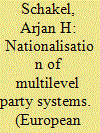

|
|
|
|
|
| Publication |
2013.
|
| Summary/Abstract |
The concept of 'nationalisation' is vigorously discussed in the literature and three dimensions have been proposed. A first dimension considers the extent to which a party's vote in territorial units varies across time and this is labeled 'dynamic nationalisation'. 'Distributional nationalisation' focuses on the degree to which there is an equal distribution of party votes across territorial units. Finally, 'party-linkage nationalisation' concerns the extent to which candidates link together under common party labels. In addition to a conceptual debate there has been a simultaneous debate on the measurement of the various forms of nationalisation. This article contributes to both debates and argues that most of the literature on nationalisation suffers from a methodological nationalism bias - that is, the tendency of many scholars to choose the statewide level and national election as the natural unit of analysis. This claim is supported by a conceptual and empirical analysis regarding the effects of decentralisation on nationalisation. The conceptual analysis shows that the non-robust findings of many studies concerning the effects of decentralisation on nationalisation can be related to the methodological nationalism bias. An effect of decentralisation is found once nationalisation is conceptualised with regard to its multilevel dimension and the measurements of nationalisation are differentiated according to parties, regions and type of elections (national or regional). An empirical analysis on the nationalisation of party systems, parties and regions in 18 countries for national and regional elections held between 1945 and 2009 shows that regional authority has a significant and robust effect on regions and regional elections but not on parties, party systems and national vote shares.
|
|
|
|
|
|
|
|
|
|
|
|
|
|
|
|
| 8 |
ID:
096671
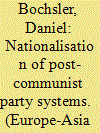

|
|
|
|
|
| Publication |
2010.
|
| Summary/Abstract |
Party nationalisation, defined as the homogeneity of party strength across a country, has recently become a major issue in research. Even though territory is a salient political question in the post-communist countries in Europe, party nationalisation in these countries has been neglected by the literature so far. This article presents data on party nationalisation for 20 countries over the period 1990-2007. It shows that the nationalisation of party systems in post-communist democracies is closely related to the territorial structure of social divisions, except for cases where the electoral systems provide for a high degree of nationalisation, or where super-presidentialism inhibits the creation of strong nationalised parties.
|
|
|
|
|
|
|
|
|
|
|
|
|
|
|
|
| 9 |
ID:
165006
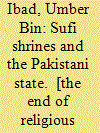

|
|
|
|
|
| Publication |
London, I B Tauris and Co. Ltd, 2019.
|
| Description |
xiii, 245p.hbk
|
| Series |
Islamic South Asia Series
|
| Standard Number |
9781788311816
|
|
|
|
|
|
|
|
|
|
|
|
Copies: C:1/I:0,R:0,Q:0
Circulation
| Accession# | Call# | Current Location | Status | Policy | Location |
| 059627 | 297.8/IBA 059627 | Main | On Shelf | General | |
|
|
|
|
| 10 |
ID:
174001
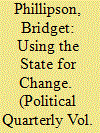

|
|
|
|
|
| Summary/Abstract |
The capacity of the state to deliver transformative social and economic change appears more limited today than since Labour was last in government. A future Labour government will therefore need to reckon with the challenges this presents when it comes to harnessing the power of the state to distribute power, wealth, and opportunity, effectively. This article considers two aspects of state power. The first is the ability of the state to enforce laws, and in doing so shape social and economic norms. With reference to past successes and failures, there is discussion of how laws and regulations could be made more effective. The second aspect is state intervention in the economy, and the circumstances in which it is possible and desirable to nationalise key industries. The case is made for a thorough assessment of the efficiency and efficacy of such interventions in the economy, especially when weighed against other policy priorities.
|
|
|
|
|
|
|
|
|
|
|
|
|
|
|
|
|
|
|
|
|